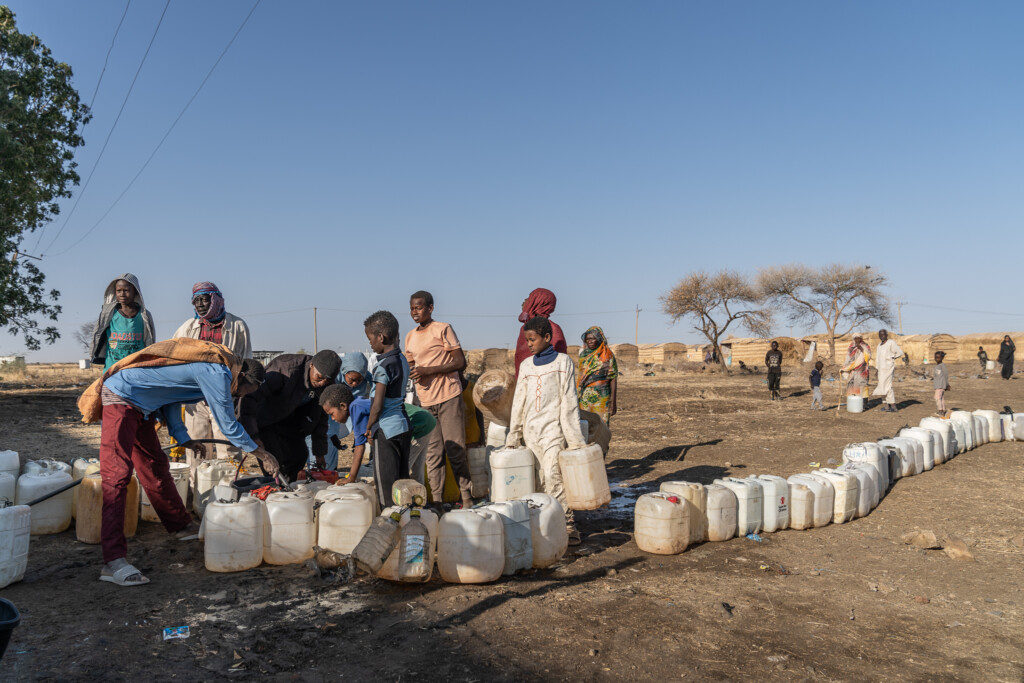UN fact-finding mission: Civilians targeted in Sudan’s ‘war of atrocities’

Displaced adults and children queue to collect water from a solar-powered pump at the Abu El Naja gathering site for displaced people in El Gedaref (Photo: Giles Clarke / UNDP)
Sudan’s warring parties are waging a “war of atrocities” that deliberately targets civilians, the UN’s Independent International Fact-Finding Mission on Sudan warned in a damning report to the Human Rights Council, on Friday.
The report accuses both the Sudanese Armed Forces (SAF) and the paramilitary Rapid Support Forces (RSF) of committing war crimes and other large-scale international crimes. They added that some of the crimes may constitute to crimes against humanity, including persecution and extermination.
Chaired by Mohamed Chande Othman, the Mission found that both sides carried out direct attacks on civilians and systematically destroyed essential infrastructure including hospitals, markets, water systems, and displacement camps.
Atrocities in El Fasher and El Gezira
Their findings documented mass killings, torture, enslavement, sexual slavery, rape, forced displacement, and persecution by the RSF and allied groups during the siege of North Darfur’s capital of El Fasher. Civilians were deliberately starved and denied medicine and humanitarian relief, acts that may amount to extermination.
“Our findings leave no room for doubt: civilians are paying the highest price in this war,” Othman said. “These are not accidental tragedies but deliberate strategies amounting to war crimes.”
In El Fasher and surrounding areas, RSF fighters and allies executed hundreds of civilians, targeting non-Arab communities such including Zaghawa, Fur, Masalit, and Tunjur. In April, between 300 and 1,500 people, mostly women and children, were massacred in Zamzam camp.
The SAF and its allies were also implicated in unlawful killings and ethnic targeting. After retaking a town in El Gezira in January, they attacked multiple *Kanabi communities, killing dozens and forcing residents to flee.
Both sides indiscriminately shelled civilian areas, destroying homes, camps, markets, and health facilities. The UN mission stated that at least 12.1 million Sudanese are now displaced. “Only one in four health facilities remains functional in the worst-affected regions,” the UN mission reported.
‘RSF slaughterhouses’
Humanitarian workers have also been attacked: 84 Sudanese aid staff were killed between April 2023 and April 2025, while others were arbitrarily detained.
The Mission documented widespread torture and inhumane detention conditions. Survivors described RSF detention centres as “slaughterhouses” where detainees were beaten to death, summarily executed, enslaved or ransomed.
Women and girls from non-Arab communities, some as young as 12, suffered systematic sexual violence, including rape, gang rape, forced marriage and sexual slavery. SAF personnel and allied forces were also implicated in sexualised torture in detention.
“Behind every documented story is a shattered family, a displaced community, a survivor of unimaginable violence,” said expert member Joy Ngozi Ezeilo.
Justice delayed
The Mission concluded that Sudan’s institutions are unwilling or unable to deliver credible investigations, instead shielding perpetrators through impunity, immunities and amnesties.
“Our report not only exposes atrocities, it also lays out a roadmap for justice,” said expert member Mona Rishmawi.
She urged the international community to enforce the arms embargo, support prosecutions through the International Criminal Court, establish an independent judicial mechanism, and impose targeted sanctions.
“Every day of inaction leaves the Sudanese people under attack,” she warned.
*Kanabi: Since 1925, when the El Gezira agricultural project was initiated by the British colonial powers, people moved from western parts of the country, including many from Darfur, to El Gezira as seasonal workers. They settled on the outskirts of villages and near irrigation channels and water banks. The settlements were called camps (kanabi).
As the successive El Gezira governments considered them temporary workers, they did not provide many services. Their lives can be characterised by poverty and isolation, due to government policies and to discrimination they face based on ethnicity and culture by the surrounding population.
According to figures presented in 2018 by Jaafar Mohamedein, Secretary General of the Kanabi Congress, the 2,495,000 kanabi living in El Gezira make up 39 per cent of the total population of the state.
Kanabi and other people from the western parts of the country also moved to eastern Sudan, in particular Sennar and El Gedaref, to work at the many farms there.








 and then
and then